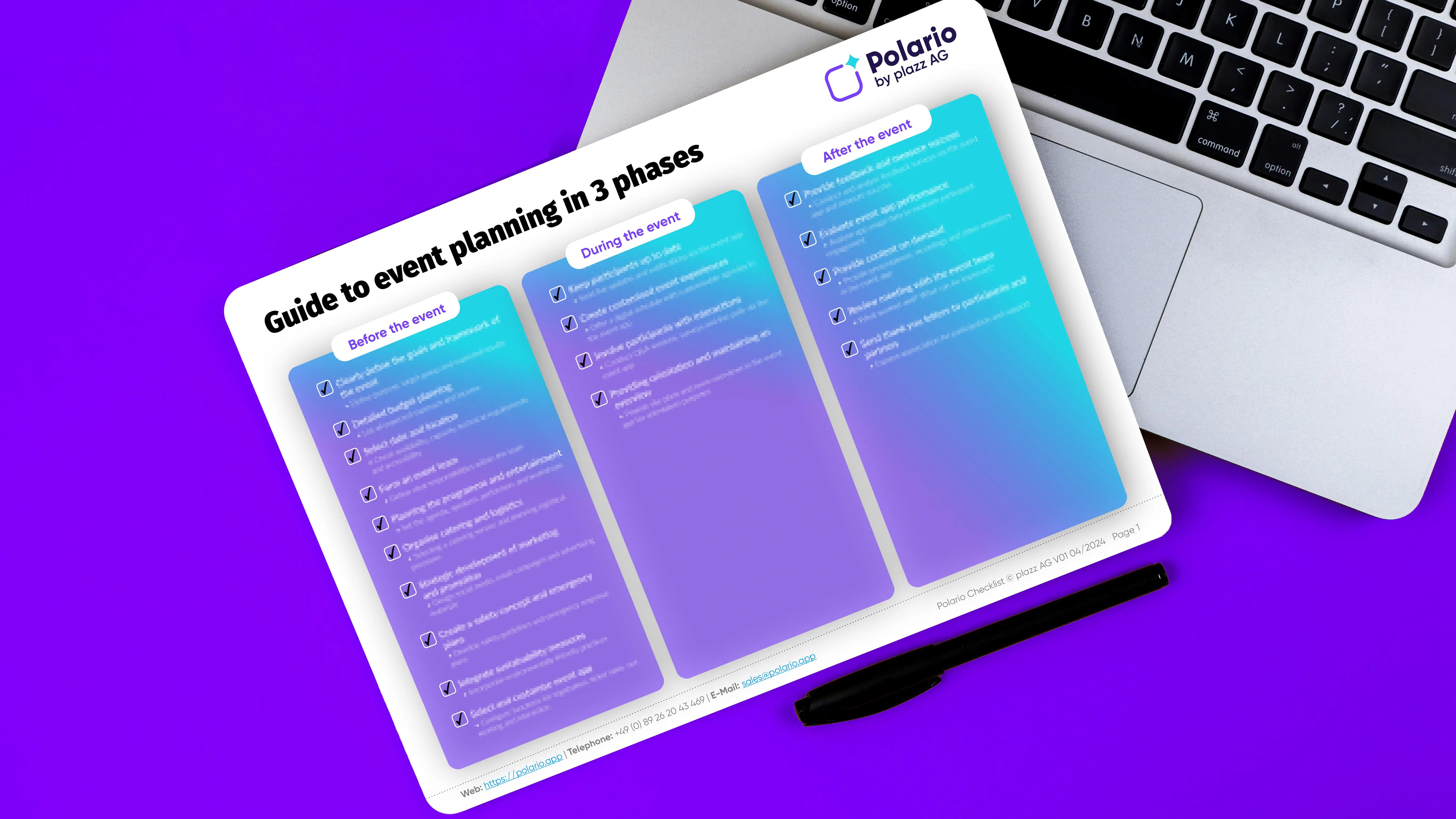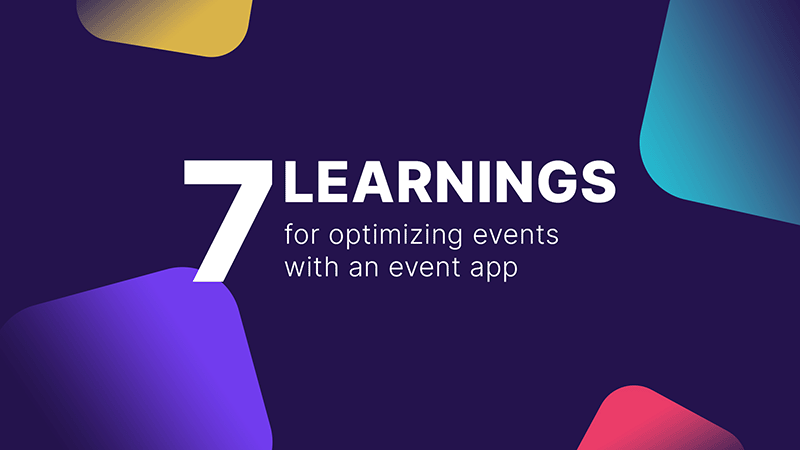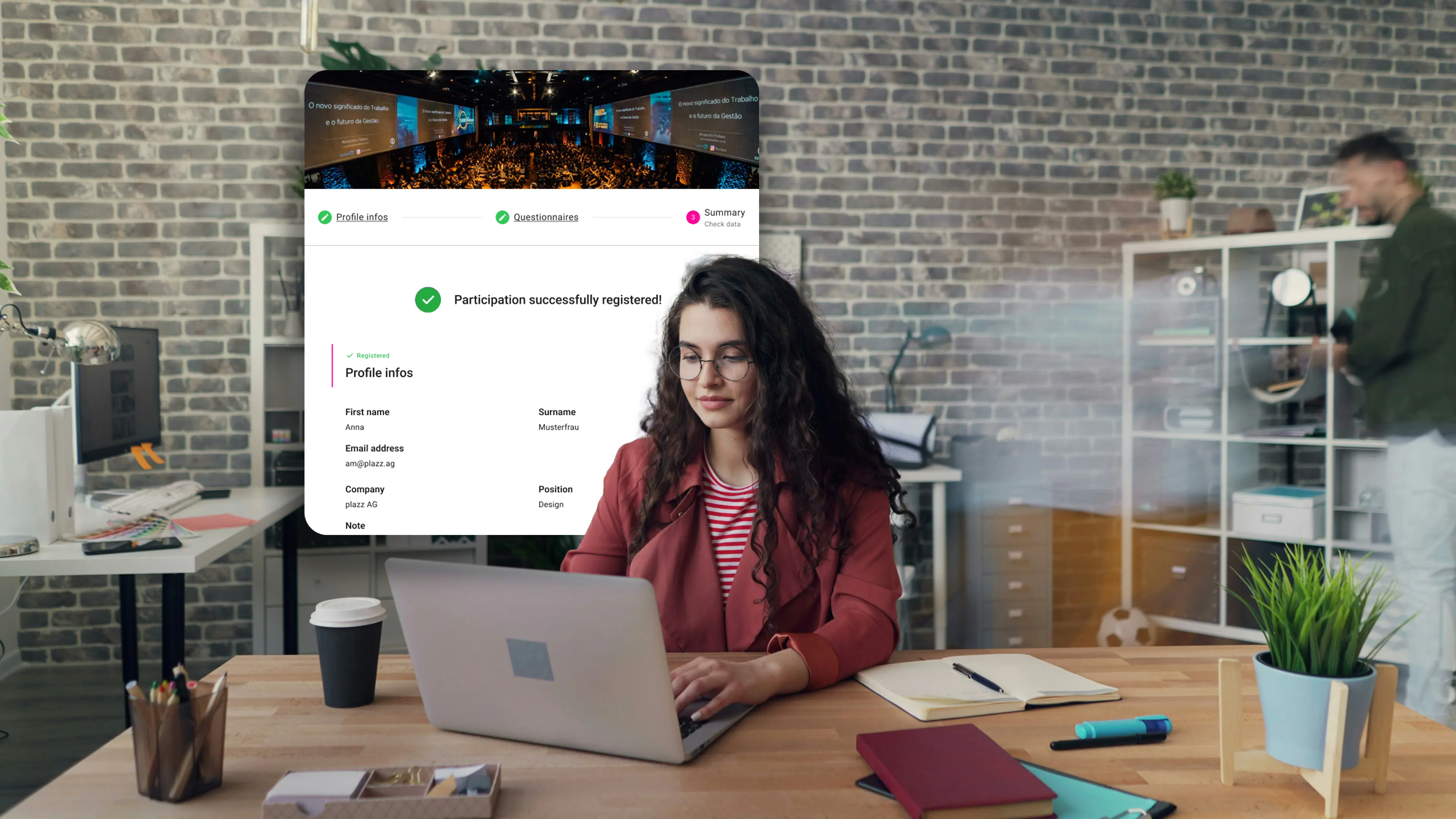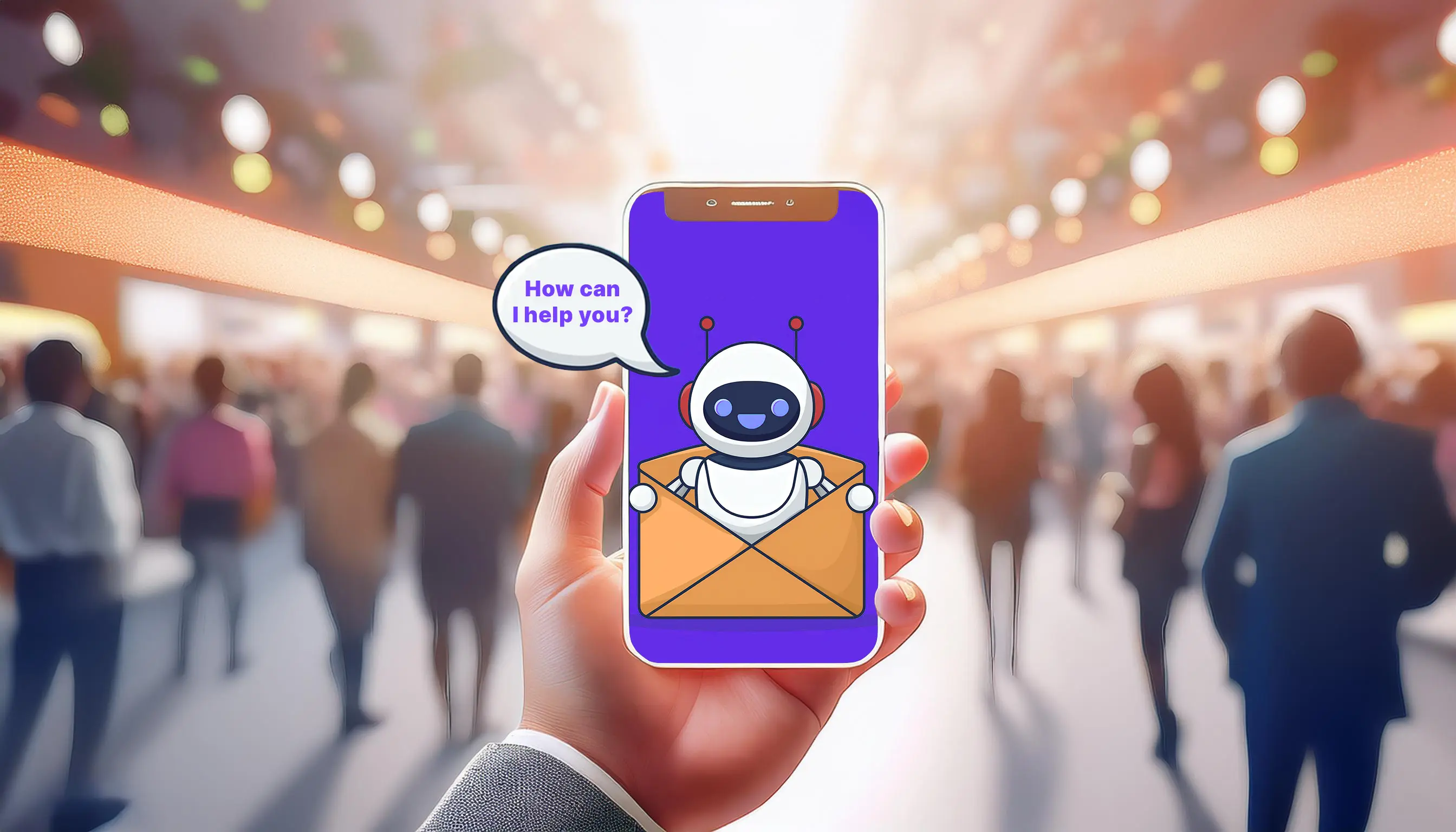Artificial intelligence (AI) for events offers a wide range of opportunities to make events more efficient, personalised and interactive. From the first planning step to the final follow-up, AI-supported technologies can optimise the entire event process.
In this blog post, we will show you the many ways in which AI can be used for events. From automated event planning and personalised marketing strategies to innovative registration systems and interactive event apps – the integration of AI offers numerous benefits. Find out how you can use these technologies to create an event experience for both organisers and attendees.
Automation of event planning through AI for events
AI-supported tools and platforms take on complex planning tasks that traditionally take up a lot of time and resources. By using algorithms and machine learning, these systems analyse historical data, current trends and specific requirements to provide precise predictions and recommendations.
Organisers can use AI to optimise dates for events by identifying the best time slots based on availability and attendee preferences. Resource management is made more efficient as AI automatically selects the best providers, services and materials based on previous events and user reviews. This not only makes the planning phase faster, but also significantly more effective.
Another outstanding feature of AI for events in the planning phase is the ability to create personalised invitations. AI analyses the target audience and their interests to send tailored invitations that encourage higher participation and engagement. This contributes significantly to optimising the number of participants and increases the overall success of the event.
Automating event planning with AI for events allows organisers to focus on more creative and strategic tasks, while routine tasks are handled efficiently and error-free. This not only leads to considerable time savings, but also to improved quality and professionalism of the planned events.
AI for events not only makes event planning easier, it also makes it smarter. Comprehensive data analysis and the ability to make automated decisions make AI an indispensable tool in modern event planning.
Personalised marketing strategies for events
To gain valuable insights into the preferences and behaviour of potential subscribers, AI-supported platforms analyse large amounts of data. These analyses allow you to develop targeted marketing campaigns that achieve higher open and click rates.
A central element of personalised marketing strategies is the segmentation of your target group. AI systems identify specific interests, demographic characteristics and past behaviour in order to divide your target group into homogeneous segments. This allows you to create personalised messages that directly address the needs and desires of each segment.

Download now! Learn how to plan events in three simple phases. Our guide makes your event planning effortless.

Our learnings from years of event experience with event apps and what aspects need to be considered to host an event in the best possible way.
Thanks to AI for events, you can also use dynamic content in your invitations and marketing materials. This dynamic content automatically adapts to the individual interests of the recipients. For example, attendees who have shown an interest in certain topics or sessions in the past can receive targeted invitations to similar events. This not only increases the relevance of the invitations, but also the likelihood of a positive response.
Another outstanding feature is the real-time analysis and optimisation of your campaigns. AI-supported tools continuously monitor the performance of your marketing measures and adjust the strategies if necessary. This allows you to ensure that your messages always have maximum impact and that your subscriber numbers increase.
Simplify registration processes with AI for events
Automated registration systems are a prime example of how AI can optimise the entire registration process for events. By using AI-powered platforms, event registration is not only made more efficient, but also more user-friendly. These systems create personalised online registration forms that are tailored to the specific needs of your event and attendees.
With AI for events, you can ensure that data entry by participants is simplified and optimised. AI-based systems check the accuracy and completeness of the data entered in real time. This reduces errors and prevents incomplete registrations, which ultimately leads to a smoother process. Participants experience a fast and straightforward registration process that improves their satisfaction and the overall event experience.
Another key feature of automated registration systems is the seamless integration with other event management tools. This enables comprehensive management of all aspects of your event, from
In addition, AI-supported registration systems provide valuable insights into the behaviour and preferences of participants. By analysing this data, you can better understand which aspects of your event are particularly well received and where improvements are needed. These insights will help you to make future events even more successful.
Integration of AI in event apps
With personalised content and recommendations based on the analysis of participant interests, each event is individually tailored to the needs of the participants. AI-supported event apps analyse the behaviour and preferences of attendees to suggest relevant content and activities.
One of the central functions is intelligent ticketing and the creation of personalised agendas. Participants receive customised schedules that are precisely tailored to their interests. This not only increases satisfaction, but also the willingness to participate in the various sessions, workshops and networking events. These personalised recommendations guide participants to the events that are of most interest to them.
Functions such as virtual assistants and interactive maps offer participants real-time support and make it easier to navigate on site. Speech recognition and real-time translations help to increase accessibility and include international participants. These technologies ensure that language barriers are broken down and interaction is facilitated.
The technical realisation of these functions is possible thanks to advanced AI technologies and innovative development approaches. Event apps use algorithms and machine learning to continuously analyse data and optimise the user experience. Examples of successful implementations show how effectively AI can be used for events to improve the overall experience.
The apps offer networking suggestions based on participants’ interests and profiles, fostering valuable connections. Gamification elements increase engagement by offering interactive and entertaining challenges. These elements increase interaction and make the event experience even more exciting.

Discover 10 networking ideas to make your events a complete success. Increase the interaction of your participants.

By using event apps, you not only save costs, but also improve the quality of experience for organizers and participants.
Data analysis and feedback evaluation
AI-supported systems collect and analyse a wide range of data generated during your event in real time. This includes
This data is analysed automatically and provides you with valuable insights. For example, you can recognise which sessions and workshops were particularly popular and which were less well received. These insights help you to better plan future events and tailor them to the interests of your target group. By using AI for events, you also receive immediate feedback that allows you to make adjustments during the event to maximise attendee satisfaction. Based on attendee behaviour and interactions during the event, tailored surveys can be generated that ask specific questions about relevant attendee experiences. This leads to more detailed and meaningful feedback that can be directly incorporated into the planning of future events.
In addition, AI for Events helps to transform the collected data into easy-to-understand reports and dashboards. These visual representations allow you to recognise at a glance what worked well and where there is room for improvement. Automatic data processing not only saves time, but also increases the accuracy of analyses.
Conclusion
The ability of artificial intelligence to automate processes, analyse data and create personalised experiences opens up completely new possibilities for event organisers. By using AI for events, you not only increase the efficiency of your planning and execution processes, but also create added value for your attendees through customised experiences and interactions. Event organisers who embrace AI for events early on will gain a competitive advantage by not only making their events smoother and more engaging, but also gaining valuable insights for continuous improvement. Use these technologies to create innovative and successful events that meet the expectations of your attendees and leave a lasting impression. Investing in AI is an investment in the future of your events
You might also be interested in

Optimised visitor management improves the satisfaction of your event visitors and ensures clear processes and a better experience.

Discover how an optimised registration form improves event processes, reduces dropouts and enables automation.


